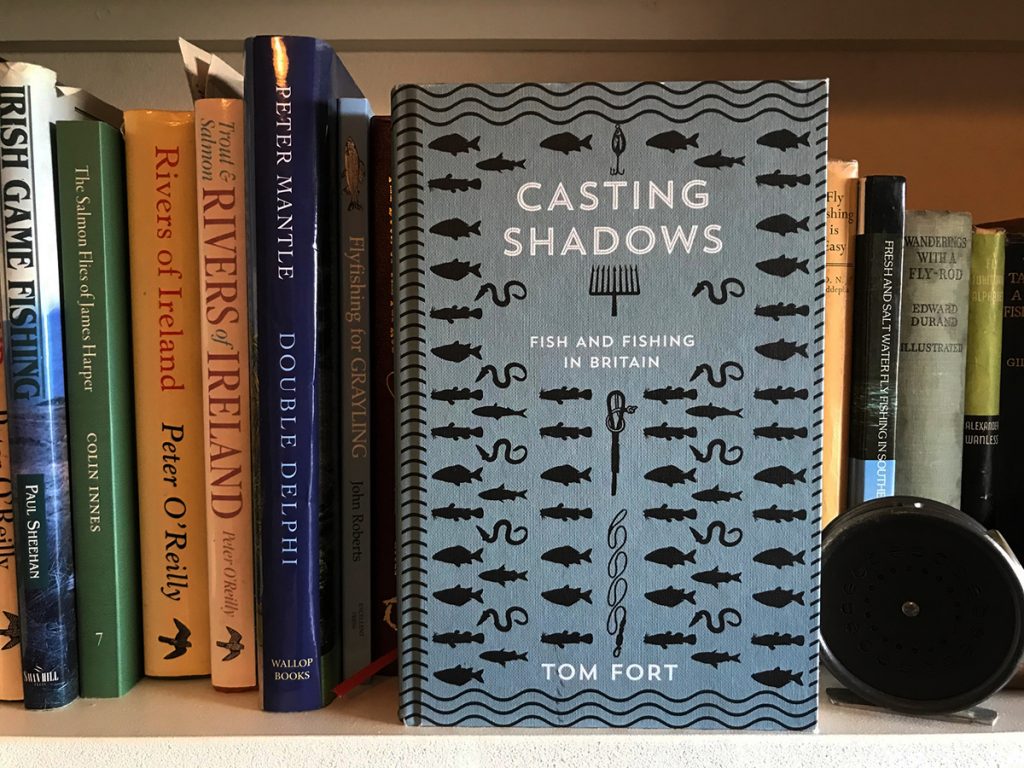
Published by William Collins, 2020
“Fort has written a book that can act as a call to arms, explaining our history and offering us the opportunity to do something about our future. It is a hugely ambitious idea, perfectly executed.”
“Now is a suitable time to look at the very long history of how we have made use of our freshwater fish as a source of protein – a history that has not been celebrated, nor even hardly told, because fish are fish and not much regarded by society at large… First, as a matter of fishing to eat and survive. Second, the need to fish became a business and the fish a trading commodity. Later still – but not that much later – the business gave birth to a desire to pursue, outwit and catch the fish for the pleasure of it. This is what we call angling.”
Casting Shadows: Fish and Fishing in Britain is an historical account of the UK’s relationship with freshwater fish, including those that brush with salt, such as the salmon and the eel. It carefully charts how we hunted fish for food, how the role they played in our lives largely shifted from one of necessity to one of pleasure, and how the two are still sometimes at odds with each other.
We see the gradual decline of fishing as a means to live, as long-held skills are left to slowly die out. We learn of the class divide in the access and ownership of much of the UK’s fishing, and how fishing itself segregated into clearly defined disciplines, often due to quarrels and infighting. We mourn the wanton waste of resources, the effects of intensive agriculture and the horrors of industrial fish farming. We discover how we moved almost entirely away from fishing to survive, to fishing as a means for the fish to survive, of the angler as conservationist, often being the loudest and the last voice in the protection of those species we have historically plundered.
I know Fort as someone who speaks his mind, who uses words supremely well, and he writes confidently about a subject that has obviously required much research. He delves deeply into the past, constructing a careful narrative that takes us quickly through several thousand years of history without being overly academic, to the point where fishing really started to change into what it is today, around the time of the publication of The Complete Angler. From here the book gathers substance, but what came before is essential.
Fort offers the reader gentle breaks by leaving the libraries at key moments to visit important places on his trusty bike, seeing first hand the evidence of a constantly changing history. This adds a sprinkling of the intimate to a brush that often needs to paint a broad picture: neolithic traps, clever Roman nets, monastic ponds, the bucolic wanderings of 17th century writers avoiding the horrors of civil war, the privileged quarrels of Victorian society seeking the gentrification of the sport, the plundering of stocks to feed the masses, the stratospheric popularisation of the sport among the working classes during the 20th Century before its eventual and dramatic decline, to the somewhat ironic gradual improvement of water quality in a post-industrial landscape.
The 314 pages, and the additional 40-odd of acknowledgements, appendixes and indexes are testament to the amount of research done, but history is only the framework around which the mastery of this book is built.
Though predominantly a fly angler, Fort has never abandoned his coarse fishing roots and is often on the bank chasing perch or pike, a tench or a Thames chub. Not for him the pointless divisions of our sport when we have much work still to do to save our landscape and our fish. That is key, because at the centre of this book lies the conviction that everything in angling is connected, that the management of resources and the landscape is essential. It is vital to understand our history as the angling community is the greatest advocate many of our species have.
I know the author is not one for pointless romanticism, but nor is sentimentality completely ignored. Fort reminds us that his has been a life spent with rod in hand, that he is an angler at heart, and his love of the sport is there for all to see. The contemporary accounts of growing up in the time of Dick Walker are especially compelling. His thorough approach to research and his well constructed narrative is enhanced by the intermittent windows where we see angling and its history through his eyes, a view that is often poignant but with subtle layers of hope. And that is the emotion I felt at finishing this book. To love the sport, it really helps to understand it. The past is the past, but the future, no matter how it looks, can be bright. Without preaching, but through teaching, he constructs a robust forum to deliver a powerful message.
Fort has written a book that can act as a call to arms, explaining our history and offering us the opportunity to do something about our future. It is a hugely ambitious idea, perfectly executed. After a lifetime in angling and writing, and with what he has described as his last book on fishing, the author has arguably created his magnum opus. I challenge you to read it and not feel compelled to action.
Review by Garrett Fallon
To buy: https://www.anglebooks.com/casting-shadows-fish-and-fishing-in-britain-by-tom-fort.html
